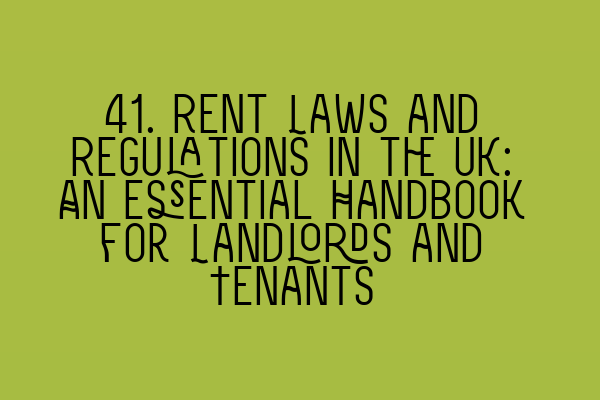Rent laws and regulations are crucial for both landlords and tenants in the UK. Understanding the legal framework governing rent is essential to ensure a smooth and legal tenancy agreement. As a solicitor at SQE Property Law & Land Law, I have extensive experience in dealing with rent laws and regulations and am here to provide you with an essential handbook on this topic. In this blog post, we will cover key aspects of rent laws, rights and responsibilities of landlords and tenants, and important considerations for both parties.
1. Understanding Rent Laws and Regulations
Rent laws and regulations in the UK are designed to protect the rights of both landlords and tenants. The primary legislation governing residential tenancies is the Housing Act 1985. This act sets out the legal requirements and procedures relating to rent, tenancy agreements, and various other aspects of renting a property. It is essential for both landlords and tenants to familiarize themselves with this act to ensure compliance and avoid any legal issues.
Additionally, various regulations and local bylaws may apply to specific areas or types of tenancies. For example, the Tenancy Deposit Protection Scheme requires landlords to protect their tenants’ deposits in a government-approved scheme. Failure to comply with this requirement can result in severe penalties for landlords.
2. Rights and Responsibilities of Landlords
Landlords have specific rights and responsibilities under the UK rent laws. It is crucial for landlords to understand these to avoid legal disputes and ensure a positive landlord-tenant relationship. Some key rights and responsibilities of landlords include:
- Providing safe and habitable accommodation
- Protecting tenants’ deposits
- Providing necessary repairs and maintenance
- Notifying tenants in advance regarding rent increases
- Respecting tenants’ privacy and right to peaceful enjoyment of the property
For a comprehensive understanding of landlord rights and responsibilities, I recommend reading our detailed article on SQE 2 Preparation Courses.
3. Rights and Responsibilities of Tenants
Tenants also have specific rights and responsibilities under UK rent laws. Understanding these rights and responsibilities is crucial for tenants to ensure a smooth tenancy and protect their interests. Some essential rights and responsibilities of tenants include:
- Paying rent on time and adhering to the tenancy agreement
- Reporting any repairs or maintenance issues promptly
- Enjoying peaceful and quiet enjoyment of the property
- Challenging unfair rent increases
- Notifying the landlord when planning to vacate the property
Our article on SQE 1 Preparation Courses provides comprehensive information on tenant rights and responsibilities, enabling tenants to navigate the rental process effectively.
4. Important Considerations for Landlords and Tenants
In addition to understanding their rights and responsibilities, landlords and tenants must consider various other factors to ensure a successful tenancy. Some important considerations include:
- Tenant screening: Landlords should conduct thorough tenant screenings, including background checks and references, to ensure reliable and trustworthy tenants.
- Tenancy agreements: A well-drafted and comprehensive tenancy agreement is essential to protect the interests of both landlords and tenants. It should clearly outline the terms and conditions of the tenancy, including rent amount, payment due dates, and any additional clauses.
- Property inspections: Regular property inspections can help identify any maintenance or repair issues promptly, preventing them from escalating and protecting the property’s condition.
- Dispute resolution: In the event of any disputes or conflicts between landlords and tenants, it is advisable to first attempt mediation or negotiation. If these efforts fail, seeking legal advice or alternative dispute resolution methods may be necessary.
For more in-depth information on these considerations, I encourage you to explore our detailed article on SRA SQE Exam Dates.
5. Seek Legal Advice for Complex Rent Matters
Rent laws and regulations in the UK can be complex and often subject to frequent changes. If you are faced with a particularly complicated rent matter or require clarification on any legal aspect, it is recommended to seek professional legal advice. At SQE Property Law & Land Law, our experienced team of property solicitors can provide tailored advice and guidance specific to your situation.
I hope this essential handbook on rent laws and regulations in the UK has provided you with a comprehensive understanding of this important topic. For additional resources and preparation support, check out our related articles on SQE 1 Practice Exam Questions and SQE 1 Practice Mocks FLK1 FLK2. Should you require any legal assistance or have further questions, do not hesitate to contact us at SQE Property Law & Land Law. We are here to help!
